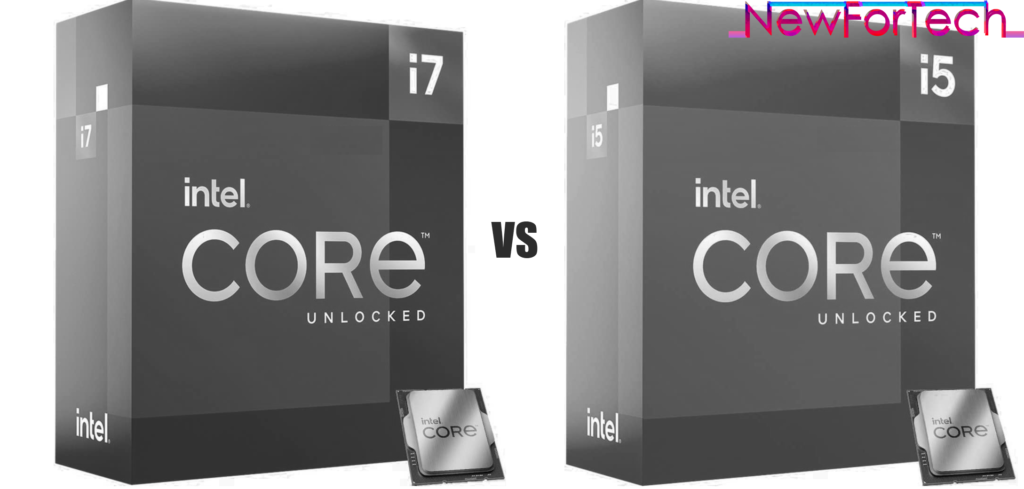Are you torn between the Intel Core i5-13600K and the Intel Core i7-13700K? We’ve got your back. Let’s compare:

Intel Core i5-13600K:
- Cores: 8 Efficiency, 6 Performance
- Threads: 20
- Base Clock (E-Cores): 2.6 GHz
- Base Clock (P-Cores): 3.5 GHz
- Boost Clock (E-Cores): 3.9 GHz
- Boost Clock (P-Cores): 5.1 GHz
- Cache: 68MB Total
- TDP: 125W
The Intel Core i5-13600K excels against rival CPUs, making it the go-to choice for most users. It offers:
Pros:
- Impressive performance
- Attractive price point
- Supports DDR4 and DDR5
Cons:
- High power consumption
- Slightly pricier than the previous generation
Intel Core i7-13700K:
- Cores: 8 Efficiency, 8 Performance
- Threads: 24
- Base Clock (E-Cores): 2.5 GHz
- Base Clock (P-Cores): 3.4 GHz
- Turbo Clock (E-Cores): 4.2 GHz
- Turbo Clock (P-Cores): 5.4 GHz
- Cache: 78MB Total
- TDP: 125W
The Intel Core i7-13700K is a versatile processor, suitable for a wide range of tasks. It excels in:
Pros:
- Top-notch performance
- Competitive Pricing
- Supports DDR4 and DDR5
Cons:
- High power consumption
- Requires a robust cooling solution due to heat generation
In summary, if you’re a general user, the Intel Core i5-13600K offers an excellent balance of performance and price, though it tends to be power-hungry. On the other hand, the Intel Core i7-13700K delivers outstanding performance across the board, making it a workhorse CPU. However, be prepared for its significant power requirements and heat output.

Intel 13600K vs. 13700K: A Head-to-Head Showdown
When it comes to desktop processors, choosing between the Intel 13600K and 13700K is a real challenge. Both chips excel at their intended tasks.
These CPUs rank among the best from Intel and are top-tier processors overall.
Intel Core i5-13600K:
- Offers strong performance for daily tasks like web browsing, video streaming, and gaming.
- Comes at an affordable price considering its advanced technology.
Intel Core i7-13700K:
- A workhorse in the Intel Raptor Lake lineup, delivering exceptional performance across various workloads.
- Handles demanding tasks with ease.
Both chips have their pros and cons. Selecting the suitable processor for your needs and budget is a crucial decision. Rest assured, I’ve extensively tested the latest PC firmware and benchmarking tools to provide you with vital data for an informed purchase.
13600K vs 13700K: Price Comparison
In terms of price, the Intel 13600K and 13700K belong to different processor classes.
- Intel Core i5-13600K has an MSRP of $319 / £299.99 / AU$499, about 10% pricier than its predecessor, the Intel Core i5-12600K.
- Intel Core i7-13700K comes with an MSRP of $419 / £399 / AU$669, roughly 2.5% more expensive than its predecessor, the Intel Core i7-12700K, and approximately 30% costlier than the 13600K.
About value, the 13600K offers the best price-to-performance ratio among Intel’s 13th-generation mainstream processors. Thus, the winner in this price battle is the Intel Core i5-13600K.
13600K vs 13700K: Specs Comparison
Let’s break down the specs for a clear view:
| Specs | Intel Core i5-13600K | Intel Core i7-13700K |
|---|---|---|
| Price | $319 / £299.99 / AU$499 | $419 / £399 / AU$669 |
| Performance Cores | 6 | 8 |
| Efficiency Cores | 8 | 8 |
| Threads | 20 | 24 |
| Integrated Graphics | Yes | Yes |
| P-Core Base Clock | 3.5 GHz | 3.4 GHz |
| P-Core Boost Clock | 5.1 GHz | 5.4 GHz |
| E-Core Base Clock | 2.6 GHz | 2.5 GHz |
| E-Core Boost Clock | 3.9 GHz | 4.2 GHz |
| L3 Cache | 24MB | 30MB |
| TDP | 125W | 125W |
| Socket | LGA 1700 | LGA 1700 |
| Max Temp | 100 | 100 |
The choice between the Intel Core i5-13600K and Core i7-13700K boils down to your performance and budget preferences. Winner: Intel Core i7-13700K.

13600K vs. 13700K: Performance Comparison
- The i7-13700K excels as a powerful CPU, while the i5-13600K performs well but can’t match the higher-tier processor.
- In synthetic benchmarks, the 13700K outperforms the 13600K by approximately 6% in single-core performance.
- For multi-core performance, the 13700K leads by about 22%, thanks to additional performance cores and faster clock speeds.
- In productivity tasks, the 13700K outperforms the 13600K by roughly 7%, benefiting from single-core dependence and improved multitasking.
- For creative tasks like video editing, the 13700K outpaces the 13600K by around 22%, due to its higher core count and faster clock speeds.
- In gaming, the 13700K shines with about 16% better performance, averaging 305 FPS compared to the 13600K‘s 262 FPS.
- Looking at thermals and power draw, the 13700K draws about 24% more power but maintains cooler temperatures, hitting a maximum of 94°C compared to the 13600K‘s 97°C.
Overall, the 13700K outperforms the 13600K by roughly 14%, making it the winner in terms of performance.
Which One Should You Buy?
- i5-13600K: Ideal for mainstream use, daily tasks, basic to moderate productivity, light media editing, and moderate gaming.
- Core i7-13700K: Suited for professional users with demanding workloads (designers, video editors, 3D modelers, developers) and gamers seeking high computational power for demanding games.
In summary, if you need a processor for casual use or light business tasks, the i5-13600K is sufficient. However, if you require top-tier gaming performance or handle heavy workloads, the Core i7-13700K is the ideal choice.
